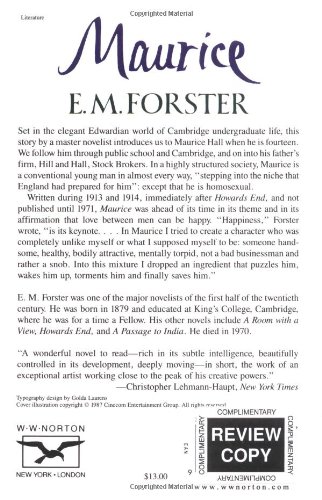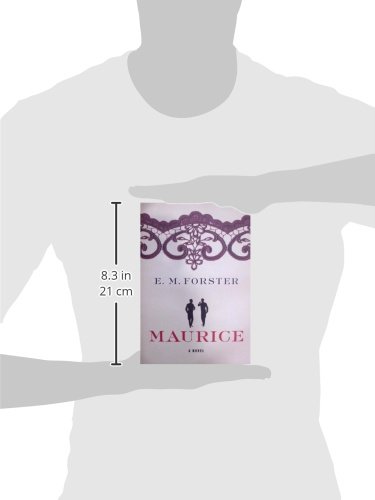





Full description not available
D**D
“You Can Do Anything Once You Know What It Is”
“Maurice” by E. M. Forster is an English language literary masterpiece classic, written in 1913-14, revised in 1932 and revised again in 1959-60, but not published until 1971 after Forster’s death. One movie, following closely the story line of the book, was produced in 1987, with notable super-stars featured, including a young Hugh Grant. Though good and beautifully filmed, the movie is far less impactful than the book.The title of this review (“You can do anything once you know what it is”) is taken directly from the text at about 90%, with Maurice stating that philosophical gem to Scudder.There are 3 primary characters: Maurice, Clive, and Alec (Scudder), all beautiful, youthful, intelligent Brits. It is a story of secret gay love in the early 20th Century, just before the onset of World War I and takes place in England, still largely Victorian in its thinking and mores.What is particularly interesting is the sociological-historical-legal-psychological context in which this story of same sex coupling takes place. The book abounds with harsh criticism of British (indeed, world) attitudes, laws, and views of homosexuality, as it was considered then (as it still is now in many places in the world) a criminal act and or a psychological deficiency, even a mental illness; in short homosexuality was something despicable and in need of erasure. Christianity and the ruling intelligentsia take a big hit from Forster. Thus, his book takes a more direct approach to the topic of gay love than, say, Mary Renault does in her exceptionally good books of same-sex love in ancient times (such as the times of Alexander the Great), including “The Persian Boy” published in 1972.All characters are perfectly captured as representatives of class society in Britain, which in the early 1900s still dominated everyday life, but it was also obvious that class society was crumbling and on its way out, due primarily to its inherent ridiculousness and the rise of a more educated middle class. Nonetheless, Maurice’s eventual final choice of partner may even be more shocking to fellow characters in the story and to readers alike who have an eye to the past, insofar as Alec (Scudder) is “low-born”.It has a slight “Days of Our Lives” feel to it (in the soap opera sense), but that aspect does not detract or subtract from the power and beauty (or message) of the story.It’s a classic novel of course, a wonderful read, and now in 2016, some 100 years later, serves well as an historical reminder of the bad old days.A 5+ of course.
D**K
Love Ultimately Prevails
I saw the film "Maurice" long before I read the book. As delightful as the movie is, the book is even better, because we are able to get into the thoughts of the characters and the mind-set near the turn of the 20th century. At first, I did not like Forster's writing style; it's almost too economical, occasionally cryptic. Many times the prepositional referent isn't altogether clear, creating unnecessary ambiguity. Moreover, a lot of the jargon is particular to second-decade England, not to current U.S readers. But as the story picks up momentum, the economy of style turns almost poetic, and the linguistic particularities fade, making this novel into a real page-turner.The story and the characters are highly realistic, even by today's standards (though written in 1914). There's the common issue of the conflict with "coming-out" gay vis-a-vis the desire to be "normal," which as Forster concludes, is essentially one and the same, regardless of nature's impulses. While to be gay is ultimately to be normal, it is not without its social and personal prejudices and misunderstandings, particularly at the time this book was written. Likewise, Forster demonstrates that gay people can (and most often do) lead quite normal, happy, even transforming lives, despite these difficulties. This is what gives the novel its joy.Above all, this is a typical story of the vicissitudes of love, the only difference being that it involves three men (and several secondary women). One man (Clive), while thoroughly enjoying his same-sex love, ultimately represses it to make himself socially acceptable, politically viable, and personally miserable. Another man (Maurice), initially thinks he has to do likewise, but he cannot suppress the insuppressible, and finally does the inevitable and heeds his nature's call. The third man (Alec) discovers his unique love, and while initially angry that his love isn't immediately reciprocated, comes to love the man who really does love him after all. In many ways, this is the ultimate "homosexual" novel, but in many other ways, it is also the universal romantic novel.Beyond the obvious love story, Forster weaves in various themes and ideas of the times (that are still with us). For the perspicuity in incorporating these themes and how they relate to being a human being first, and being gay second, Forster makes for a most satisfying reflection and examination of perennial issues. Not only is the single most important emotion, love, addressed in all its complexities, but so are certain theological, psychological, philosophical, business, and political nuances addressed. The whole enterprise is exceptionally satisfying. A novel worth anyone's time.
Trustpilot
1 day ago
2 weeks ago